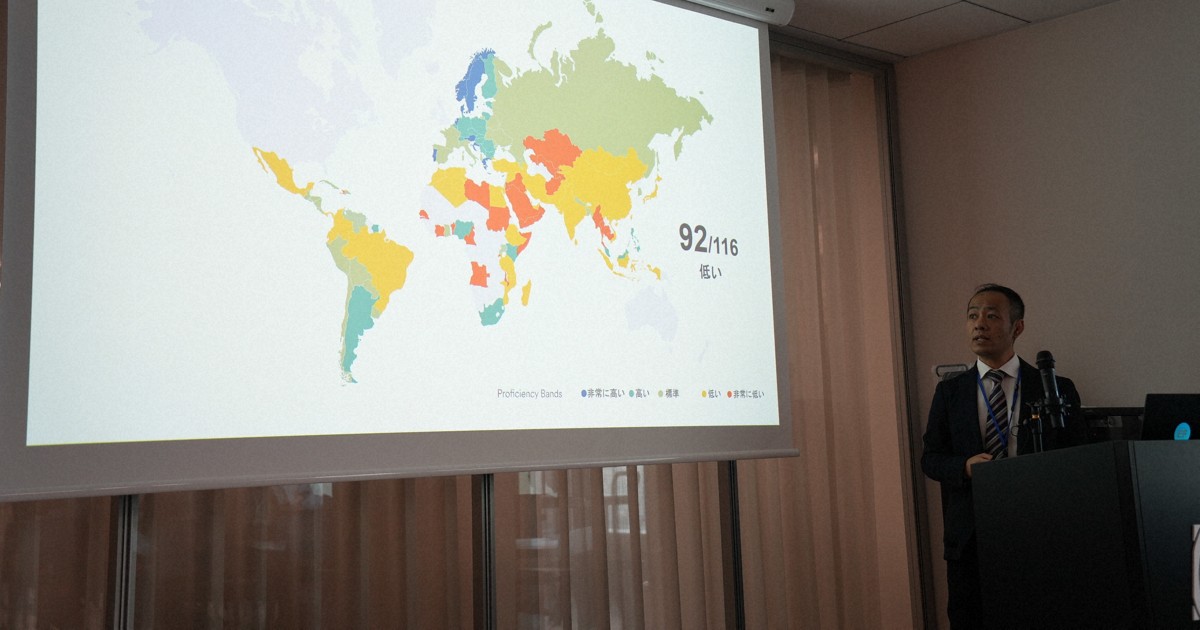Summary
Japan’s English proficiency ranking dropped to 92nd out of 116 countries, the lowest ever recorded.
The decline is attributed to stagnant English proficiency among young people, particularly due to the COVID-19 pandemic.
The Netherlands ranked first, followed by European countries, while the Philippines and Malaysia ranked 22nd and 26th, respectively.
Which is ironic given how many English loanwords have infiltrated the language in recent times, to the point where sometimes I hear Japanese speak in a not overly formal context and half of the words they say are just English words with Japanese pronunciation.
“So…how long will you be staying?”
Brasil is higher than Japan?? It’s Japan that don’t care to learn English because they can do “everything” in their country without the need to know english?
America is the past, why learn the language? China is where the future is
Doesn’t matter if America is the past. English is the language the world has settled on as the lingua franca. Yes, there are advantages to dealing with China if you speak Mandarin, but good luck trying to raise your voice while dragging out every syllable and getting yourself understood anywhere outside of China.
Removed by mod
Lets start with an English homework diving into WHY the passive voice is so bad in this particular case, that you felt the need to call it out in particular? There is nothing grammatically wrong with the passive voice, and it can be a valid stylistic choice. In this case, it was used because I as the author chose to emphasise the subject (English) as opposed to the responsible party (the world). The usual reasons to avoid passive voice do not seem to apply here. Would you care to explain why you decided to be a nitpicky asshole?
Removed by mod
Lemmy users do not like this take!
My mother in law who is an english teacher in Japan says the social media the children are consuming is distracting from their studies 😂.
So, for comparison, how do English speaking countries rank in ability to speak Japanese?
Would probably be more relevant to measure English-speaking countries’ ability to speak whatever the most commonly studied foreign language is, rather than Japanese. That would also probably need a caveat of eliminating native speakers and/or heritage speakers from the data set in some countries, as well.
Japanese isn’t widely adopted across the Internet as the default language, so this comparison is irrelevant.
I’m only familiar with Western Internet, but if you don’t understand English, you’re isolating yourself from large parts of the world.
tbf, the Japanese proficiency of English-speaking nations is probably lower.
It is a tricky language. Almost nothing in common with Indo-European languages except loan words. Completely different grammatical structure. Three different writing scripts.
At least the pronunciation isn’t too bad coming from English as all the usual sounds are represented within our phonology. Compared to Spanish rolling R’s, Russian and Arabic consonant clusters, Chinese tonality, and other difficult to pronounce languages.
as all the usual sounds are represented within our phonology
Is what you’d think, but nope. Their r, sh, j, ch and w and u sounds are slightly different from English (enough so that some languages have the English version and the Japanese version as independent sounds), the lone n consonant has a pronunciation not existent in English, and Japanese has a tone system but it’s simple enough a foreigner can get by without knowing it. That is to say, Japanese pronunciation is very different from English and decently hard to master, but if you just pronounce it like you would English (without stress of course, absolutely don’t add stress) you shouldn’t have a problem getting your point across.
Russian and Arabic consonant clusters
Wait Arabic consonant clusters? If anything Arabic has less consonant clusters than English. As a native Arabic speaker what I would think is a problem for English natives is the consonants themselves, because we have a lot of them and many don’t exist in English.
Thanks for confirming. I don’t speak Japanese but my sister studied it for a few years, and according to her, teachers were always impressed with her perfect pronunciation. We’re both native Spanish speakers in an English speaking country. From what I gather, Japanese phonology has more in common with Spanish or Italian than with English.
I would think is a problem for English natives is the consonants themselves, because we have a lot of them and many don’t exist in English.
I am not an Arabic speaker at all, but one of the few amusing points of the Iraq war was that absolutely no one in the U.S. media could agree on how to pronounce Qatar. There were even segments on how to pronounce it. They didn’t agree with each other.
Of course, they never actually put someone who spoke Arabic on TV to get them to pronounce it properly. They probably couldn’t anyway considering the intelligence level of news anchors I’ve worked with.
Thanks for that.
Japanese has a tone system but it’s simple enough a foreigner can get by without knowing it
Isn’t this just learning each word’s tonic syllable? Or if you mean the flow of a sentence, the general waving tone structure like in Spanish or French?
Neither. Japanese has two tones, high and low (for comparison Mandarin has 4 and Cantonese has I think 7), and each vowel/vowel+consonant in a word takes one of these two. For example there are a bunch of words pronounced koukai in Japanese and they’re split 50/50 on whether their tone is high low low low or low high high high, and the words oyster and persimmon (both kaki) are famous for having opposite tones, one low high and the other high low.
By the way Japanese straight up doesn’t have stressed syllables so the idea of a tonic syllable doesn’t really translate to the language.
This was in line with my immediate thoughts too.
It seems grossly unfair to judge Japanese people on their ability to speak English.
That’s a very idealistic position. English is either useful or necessary in many situations and fields, and having a population that doesn’t know English can and will cause problems. How well people in a country speak English is an important metric for that country’s development, otherwise nobody would care about it.
What are you on about? This is a survey of every country where English isn’t their primary language. This article is from Japan about Japanese proficiency in the English language.
Here is the link to the report. It wasn’t in the article.
I wonder what the methodology is. There’s no way Turkey is higher than Lebanon unless the metric is something specific that we have terrible data coverage for (which is very likely)
I also refuse to believe Hungary is in 17 when it feels like people here have a phobia of English (or a second language)
Isn’t this in European terms? Europe as a whole is extremely good at English compared to the rest of the world.
Why so? Remember that Lebanon’s preferred second language is French, not English.
I’ve been to both touristy and more “normal” parts of Turkey, and I was pretty shocked how few people understood English (or French, since you mention it). I actually mostly got by with a broken mix of English and Arabic loanwords I know they have in Turkey (or Turkish loanwords we have in Lebanese Arabic).
Drive down any road in Lebanon and you’ll see most signs, especially newer signs, are in English. When I was a kid it was mostly French and Arabic, now it’s mostly English and Arabic with some French sprinkled in. I’ve also been seeing a lot of municipal road and highway signs use “Beirut” instead of “Beyrouth”.
I think we still lean more heavily on French loanwords in our day to day Arabic, at least when not discussing something tech-related.
Also cinemas have consistently used the original English audio now, while we had a good 20% of these movies dubbed in French when I was a kid. A lot of companies’ business operations now are almost exclusively done in English (I’m talking about the documents - the conversations are naturally in Arabic).
I guess none of this is strictly true, there are areas and sectors (especially law) where French is still much more dominant. But people who are French-educated all eventually learn some English, the reverse (the category I’m in) is very rare. I still understand French, even rapid-fire French French, but speaking it or writing it has become so rare for me that it’s really atrophied over the past few years. My English is fine, because I’ve actually had to use it daily.
This is all just additional info, my point is just that Lebanon should probably be higher than Turkey on the list. Turkey has a massive domestic media machine, business is done in Turkish there, I’m pretty sure their schools teach everything in Turkish instead of having some subjects only done in foreign languages like we do. So just based on what I know in these two countries, the placements seem off, and it makes me question what else is going on with the data.
TIL… All of this.
the English proficiency of young people in the country is stagnant compared to other countries and regions.
Seems like my gut was right, that it’s less because they’re regressing, and more because other countries have been increasing theirs.
It’s still higher than the United States.
Funny. Joking aside, I don’t think England, Ireland, the US, and Canada were tested.
And, to be fair, there are millions of U.S. citizens who speak English as a second language.
About 1 in 10 according to the U.S. census do not speak English at home.
https://www.census.gov/library/stories/2022/12/languages-we-speak-in-united-states.html
Spanish is first, Chinese a distant second. I am guessing there are also plenty of indigenous people, especially in Alaska considering its isolation, who primarily speak native languages at home.
In Canada too











